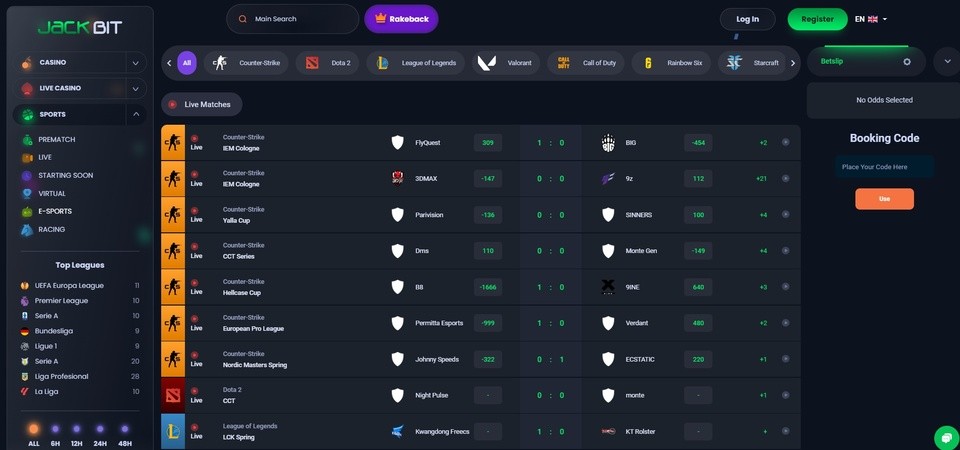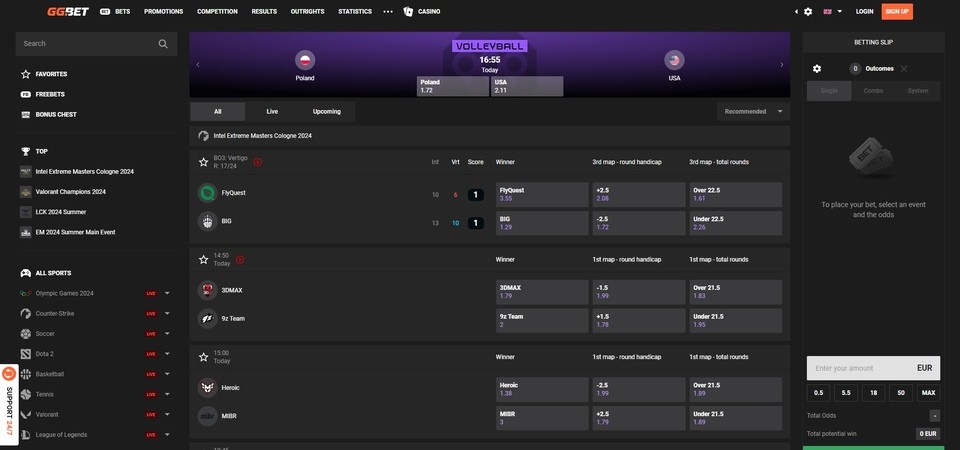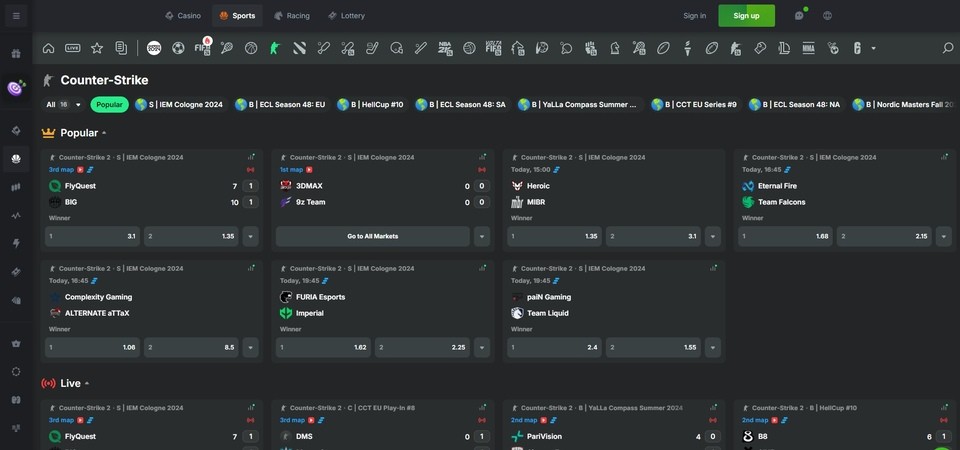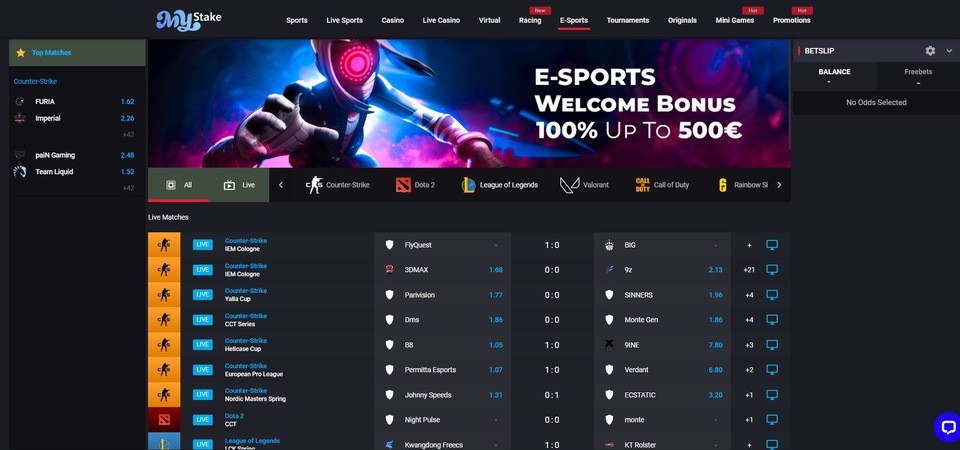Best esports betting sites in 2025: Top esports bookmakers reviewed
If you’re hoping to find the best esports betting sites, then we’re here to help. As you read through this article, you’ll be introduced to the 10 best esports bookmakers and learn all about what these sites have to offer. We’ll be sharing all you need to know about the best ways to bet on esports, the offers up for grabs, and where you’ll find the best odds. We’ll also be looking at the sites offering top coverage for esports tournaments.
Best esports betting sites for e-gaming fans in 2025
Found: 14 Bookmakers
| Rank | Bookmaker | Bonus | Claim | |
|---|---|---|---|---|
| 1 |
 1xBet
1xBet
|
100% Welcome bonus up to €130 18+ T&C apply, GambleAware.org |
Copied!
|
|
| 2 |
 Melbet
Melbet
|
150% Welcome bonus up to €100 18+ T&C apply, GambleAware.org |
Copied!
|
|
| 3 |
 Megapari
Megapari
|
100% Welcome bonus up to $230 18+ T&C apply, GambleAware.org |
Copied!
|
|
| 4 |
 Paripesa
Paripesa
|
100% Welcome bonus up to €130 18+ T&C apply, GambleAware.org |
Copied!
|
|
| 5 |
 22Bet
22Bet
|
100% Welcome Bonus up to €122 18+ T&C apply, GambleAware.org |
BET HERE Go to 22Bet website | |
| 6 |
 20Bet
20Bet
|
100% Welcome bonus up to €100 18+ T&C apply, GambleAware.org |
BET HERE Go to 20Bet website | |
| 7 |
 BetWinner
BetWinner
|
100% Welcome bonus up to €100 18+ T&C apply, GambleAware.org |
BET HERE Go to BetWinner website | |
| 8 |
 Ivibet
Ivibet
|
100% Welcome bonus up to €150 18+ T&C apply, GambleAware.org |
BET HERE Go to Ivibet website | |
| 9 |
 Powbet
Powbet
|
100% Welcome bonus up to €100 18+ T&C apply, GambleAware.org |
BET HERE Go to Powbet website | |
| 10 |
 Sportaza
Sportaza
|
100% Welcome bonus up to 100$ 18+ T&C apply, GambleAware.org |
BET HERE Go to Sportaza website | |
| 11 |
 Freshbet
Freshbet
|
100% Welcome Bonus up to €500 18+ T&C apply, GambleAware.org |
BET HERE Go to Freshbet website | |
| 12 |
 1Bet
1Bet
|
100% Welcome bonus up to €150 + 100 FS 18+ T&C apply, GambleAware.org |
Copied!
|
|
| 13 |
 Mostbet
Mostbet
|
150% Welcome bonus up to $400 18+ T&C apply, GambleAware.org |
Copied!
|
|
| 14 |
 bet365
bet365
|
Welcome Bonus Up To €100 In Bet Credits 18+ T&C apply, GambleAware.org |
BET HERE Go to bet365 website |
Our top betting sites for gambling on esports
Updated:
Table of contents
Here, you’ll find all the information on the best sites for esports betting in 2025.
- A closer look at our favourite esports bookmakers
- Side-by-side comparison of our top esports betting sites
- How we picked the best esports betting websites
- How you can choose the best esports betting site: our insights
- How to place an esports bet step-by-step
- Helpful esports betting tips and strategies for new bettors
- Explaining popular esports betting markets
- Our favourite game titles for betting on esports
- Upcoming esports events to bet on in August 2024
- Our verdict on the best sites for esports betting
- Additional esports betting resources
- Q&As about esports bookies

Esports betting is becoming increasingly popular, and there are now more sites to choose from than ever before. If you want to know where we wager ourselves, below you’ll find our list of the best esports betting sites for 2024. Each site offers a wide range of betting opportunities across various types of esports. Let’s look at these sites now:
1. Jackbit
2. GGBET
3. BC Game
4. Stake
5. bet365
6. GAMIX
7. MyStake
8. Parimatch
9. 1xBET
10. BetWinner
A closer look at our favourite esports bookmakers
Now that you’ve seen our list of the best bookmakers covering all things esports, it’s time to look at them in more detail. Below, you’ll find full details of the best online esports betting sites. We’ll be sharing all that you need to know about each betting platform, the different esports you can bet on, and the top esports betting site offers.
1. Jackbit

When looking to bet on esports, Jackbit is our number-one choice. Launched in just 2022, this site has quickly established itself as the best when it comes to esports betting. The presence of a Curacao licence also confirms that this is safe platform to bet at.
So, what makes this our number-one choice? Well, it’s a combination of things and the overall betting service offered. Firstly, there’s the welcome bonus that offers a 100% refund up to $100 (or your local currency equivalent). This can be used on esports and traditional sports betting. Then there’s the range of features, such as the bet builder, in-play betting, live streams and cashout. There’s also the attractive margins across esports that come in at just 6.31%. This all makes Jackbit the go-to site for those who want to bet on esports.
You’ll find that Jackbit has all of the best esports covered. There are games like DOTA 2, COD, LoL, and so much more. Some online reviews criticise JackBit for having no coverage of Rocket League, but this has clearly changed as we can see that it’s available now. The other plus point here is that whenever there’s a major esports tournament, you can be sure that this site has an array of markets to bet on.
When it comes to payment options, there are the likes of Skrill, Apple Pay, and Neteller to choose from. There are also 17 cryptocurrencies available for use. There are no published limits for deposits but with withdrawals these are set at £/$10 to £/$50,000. With crypto, withdrawals are instant whereas other options can take up to three days.
Here’s a look at what our expert, Jeffrey Gynn, is saying about the Jackbit site:
 Jeffrey Gynn
Jeffrey Gynn
Jackbit is my top choice for esports betting. Thanks to the great coverage of events and markets, this is the best esports betting platform in the world.
- Advantages
- 6.31% margins
- Best DOTA 2 betting
- Instant withdrawals
- Limitations
- No app
- Lack of esports-specific offers
2. GGBET

GGBET is another one of the best esports sites around. Launched in 2016, this platform is licensed by the UK Gambling Commission (UKGC) as well as the Curacao government. This means that GGBET is safe and secure to bet at.
We like the welcome bonus here that is spread across your first two deposits. You can claim a 150% match up to £/$130. Your second deposit attracts a 150% match up to £/$100. Beyond this, there are also ongoing bonuses for esports. There’s bet insurance for DOTA 2 and then there are cashback offers for VALORANT. As well as great offers, GGBET also comes with a stunning live stream for in-play bets and healthy betting odds with margins at 6.3%.
GGBET covers all of the popular esports games that you’d expect to find at one of the best bookmakers. The esports section covers the likes of Smite, DOTA2, Fortnite, LoL and HALO. The range of esports to bet on is truly outstanding, as are the esports betting options. You’ll find pretty much any market that you can think of.
The payment options here cover all of the major e-wallets and cryptos, as well as Visa. Deposit limits range from £/$5 to £/$97,000 while withdrawals start at £/$50 with no upper limit. If you’re using crypto, funds are with you within one hour, while e-wallets and Visa take 1–3 days.
 Jeffrey Gynn
Jeffrey Gynn
GGBET has pretty much every esports title covered. With attractive odds and all esports markets available, this is a truly impressive site.
- Advantages
- Esports-specific bonuses
- Live stream
- iOS and Android app
- Limitations
- Basic website
- Promotions page set out poorly
3. BC GAME

BC Game is another giant in the esports betting world. Hitting the scene in 2017, the platform is regulated by the Gaming Control Board and the UKGC. It’s worth noting that the main site can’t be accessed in the UK. However, when trying to enter, you’ll be redirected to another version of the platform.
When you bet at BC Game, wagers are made in the crypto that’s native to the platform, known as BCD. This currency is pegged to the US Dollar, meaning that 1 BCD has the same value of 1 USD. There are four stages to the welcome bonus here and this is what they look like:
- 180% match to 20,000 BCD
- 240% match to 40,000 BCD
- 300% match to 60,000 BCD
- 360% match to 100,000 BCD
This betting site offers a wide range of the biggest esports around. There are more than 250 betting options and, once we’d logged in, we were presented with 135 live events ongoing. These included FIFA, COD, and Counter Strike. Of course, the in-play odds are constantly shifting, but we found average margins for fixed odds betting to be around 7%. A little higher than what we’ve seen so far, but still more than respectable.
When you make a deposit here, you’re using your funds to buy BCD. You can use Visa to do this, as well as a range of e-wallets and cryptos. Deposit limits range from £/$10 to £/$2,000. Withdrawals take between an hour and three days, depending on the method used. Limits are £/$20 to £/$10,000.
 Jeffrey Gynn
Jeffrey Gynn
An attractive esports site with a huge variety of betting options, BC Game is certainly worth a visit.
- Advantages
- 4-stage welcome bonus
- 250 betting options
- 24/7 customer support
- Limitations
- No specific esports offer
- No cashout feature
4. Stake

Stake has been a popular esports betting site since 2017. It comes with a Curacao licence and, also featuring sponsorship deals with the likes of Everton FC, this is a reputable site that can be trusted.
It’s worth mentioning right away that, when you sign up as a new customer, there’s no welcome bonus. This means no matched deposit and no free bet. Also, as an existing punter, the offers are limited to certain sports and don’t come over into esports. While esports bettors will understandably feel disappointed, there are still plenty of reasons for Stake to be included in our list of the best betting sites.
What’s great here is the fact that there are so many events to choose from. The major leagues are all covered and you’ll find amazing coverage of tournaments, such as the ongoing esports World Cup. Some of the titles that we came across at this online betting site included Age of Empires, VALORANT, Starcraft, and FIFA. The betting experience was enhanced by the in-play options and the range of prop bets offered. The esport odds are competitive with an average margin at around the 7% mark.
Payment methods include MasterCard, Apple Pay, GPay, and Samsung Pay. Deposits can be made from £/$10 up to £/$2,000 while the maximum withdrawal is £/$10,000. Withdrawals take up to five days, but you can opt to use crypto and then withdrawals only take up to an hour.
 Jeffrey Gynn
Jeffrey Gynn
Stake has an outstanding reputation as a sports betting site and it also offers an exceptional experience with esports online betting.
- Advantages
- 7% margins
- One-hour withdrawals
- Great tournament coverage
- Limitations
- No welcome bonus
- No live chat for customer support
5. bet365

Launched back in the year 2000, bet365 is one of the older operators in the betting industry. Over the last two decades, it has proven itself to be an amazing online bookmaker and the UKGC and Malta Gaming Authority (MGA) licences show that it can be trusted.
While bet365 is widely known for sports betting, the welcome bonus can be used on esports too. Here, when you place a £10 bet, you’re rewarded with a £30 free bet to use as well. However, where things get more interesting is when you explore the ongoing promotions. There are ongoing bet boosts to use on any esports bet and these can turn out very profitable.
When looking at the esports to bet on, there’s plenty to choose. You’ll find titles such as Honour of Kings, Rocket League, and LoL. The live betting options are attractive here and we certainly appreciate the quality of the live stream. There were also plenty of bet types to explore, such as props, moneylines and outrights. The average margins across esports are 7.4%.
When exploring the cashier section, we saw that you could use the likes of Visa, MasterCard, and Skrill. Minimum deposits and withdrawals are set at £5. The maximum deposit is £30,000, while the cap on withdrawals is £40,000. If you use cards for withdrawals, these can take up to five days. With Skrill, funds should be with you within 24 hours.
 Jeffrey Gynn
Jeffrey Gynn
When looking to place bets on esports, this is one of the best sites around. The ongoing bet boosts make visiting this platform a must.
- Advantages
- Ongoing bet boosts
- 24/7 customer support
- Live stream
- Limitations
- Low welcome bonus
- Slower withdrawals
6. GAMIX

This operator launched in 2021 and has a licence from the government of Costa Rica. While big in Canada, unfortunately this site can’t be used for UK betting right now. Hopefully this will change in the future.
What’s special about GAMIX is that it’s a dedicated esports site. This means that you won’t find any traditional sports betting here. What you will find though are some great esports bonuses. You can benefit from your first three deposits, with the first offering a 100% match to $500, the second offering a risk free bet, and the third gifting a $10 free bet. Bearing in mind that this is a crypto-only site, the bonuses come in the relevant crypto equivalent. Alongside these offers, there’s also the chance to claim 20% cashback every day.
As you’d expect from a site dedicated to esports, there’s nothing lacking here in terms of events and markets. Practically all leagues are covered and we were impressed by the coverage of tournaments too. We were also impressed when we looked at the esports odds here, with average margins of 6.5%.
As we’ve said, GAMIX is a crypto-only site. Minimum deposits are 0.0004 BTC and 0.0007 ETH. There are no upper limits. Withdrawals have the same limits and are instant. The downside here is that fees apply. These are 0.0002 BTC or 0.00069 ETH.
 Jeffrey Gynn
Jeffrey Gynn
As an esports-only site, GAMIX has so much to offer. What really grabbed my attention was the daily cashback offer.
- Advantages
- Esports only
- Daily cashback
- Instant withdrawals
- Limitations
- Withdrawal fees
- No app
7. MyStake

Another operator to offer just esports, MyStake hit the betting scene back in 2019. It comes with a Curacao licence and has a solid reputation. We did see some people raise issues in relation to delayed withdrawals, but a deeper look suggests that this was down to terms and conditions being breached.
When you sign up at MyStake, the welcome bonus on offer is a 100% match to £/$500. There’s also the chance to place three bets and get a fourth bet free. In terms of ongoing promotions, esports fans can claim a weekly 35% match reload up to a maximum of £/$125.
When looking at the esports offered here, we were pleased to see major titles, such as LoL, Starcraft and VALORANT. There are plenty of markets to explore and we also enjoyed our time spent in the live betting section. The live stream here is HD quality and allowed us to immerse ourselves in the action. We found the odds to be decent here too, with average margins of 6.7%.
The cashier section allows you to use Visa, MasterCard, and ten different cryptos. You can deposit anywhere from £/$10 to £/$100,000 while withdrawals range from £/$20 to £/$100,000. Using crypto, you’ll see your funds in an instant.
 Jeffrey Gynn
Jeffrey Gynn
As one of the best esports betting sites in 2024, MyStake provides an outstanding in-play experience and comes with a generous weekly reload.
- Advantages
- Two welcome bonuses
- Live stream
- Weekly reload
- Limitations
- No app
- Live chat can be slow
8. Parimatch

If you’re a fan of sports betting, you’ll already know the name Parimatch. What you may not know is that it also comes with a great esports betting section. Having launched in 1994, this operator has licences from Curacao, the MGA, and the UKGC.
As of August 2024, Parimatch is running a summer welcome bonus. This offers new customers the chance to claim £/$50 of free bets once they wager £/$10 themselves. Alongside this, there are also specific esports bonuses. The first time, you can bet £/$10 and get £/$30 in free bets. The second time, you bet £/$10 and get £/$20 in free bets. We haven’t found any ongoing offers.
As we explored the esports games catalogue, we found that there were the likes of Counter Strike, VALORANT and DOTA2. We also found that we could bet on a range of markets and that the number of esports events came to more than 200. The odds here aren’t quite as good as some of those we’ve seen so far, with margins averaging 8%.
Looking at payment options, the choices include Bitcoin, Skrill, MasterCard, Visa, and Neteller. The minimum deposit is just £/$1 with no upper cap. With withdrawals, the minimum is £/$10 and, again, there is no upper limit. Withdrawals take up to 24 hours unless using crypto, when you can expect funds within an hour.
 Jeffrey Gynn
Jeffrey Gynn
It’s great to see that Parimatch has bonuses that are dedicated to esports bettors. This is one of the top destinations to place an esports bet.
- Advantages
- Esports bonuses
- Live stream
- iOS and Android app
- Limitations
- Higher 8% margins
- In-play section can be confusing
9. 1xBET

The first key point here is that 1xBET is no longer available to UK punters. However, it still offers a great betting experience for those in Canada and beyond. Launched in 2007, the site is licensed by the government of Curacao and has built an impressive reputation for itself.
We were pleased to find a generous welcome bonus here and new customers can take advantage of a 100% match up to $540. While this bonus is good to see, what would be better is if there were ongoing promotions for esports. As it stands, there are none that we can see.
When it comes to esports that can be bet on here, this operator is a little different. You’ll find classic titles such as LoL and FIFA, but the main focus is elsewhere. This is because 1xBET seems more interested in the ‘e’ versions of traditional sports. Hence, you’ll see plenty of activity with the likes of eFootball and eVolleyball. Also, across the esports here, the odds are competitive with margins at just over 7%.
The cashier section here provides choices such as MasterCard, AstroPay, and Visa. There are also a variety of cryptos to choose from and no upper limits with deposits or withdrawals, with the minimums at $1 and $5, respectively. Funds can reach your account between 1 and 24 hours.
 Jeffrey Gynn
Jeffrey Gynn
It’s a shame that UK players can no longer enjoy what 1xBET has to offer. For now, this is one for our Canadian readers who can pocket a healthy welcome bonus.
- Advantages
- $540 welcome bonus
- 7% margins
- Phone support
- Limitations
- UK excluded
- Can be hard to navigate
10. BetWinner

BetWinner is another esports betting site that our UK readers can’t use right now. With a Curacao licence and having launched in 2019, it is available to Canadian bettors, as well as to other countries around the world.
The welcome bonus here offers new customers the chance to claim a 100% match up to $100. We were left feeling a little let down at the lack of ongoing offers. There’s plenty to explore for those looking to bet on traditional sports, but there’s an absence of any dynamic esports offers.
There’s plenty to be excited about when it comes to the events and the extensive betting markets here. Top titles are covered and, while we were logged in, there were hundreds of events ongoing. It was good to see how much attention was been given to the esports World Cup. Plus, the odds here make this site an attractive option too. We found that the margins ranged from 6% to 7%.
The payment options include an impressive 25 cryptocurrencies. There are also options such as Skrill, Visa, and AstroPay. You can deposit as little as $1 with no upper limit. Withdrawals start at $1.50 and have no cap. The fastest withdrawals can be made via crypto and funds will reach you within an hour.
 Jeffrey Gynn
Jeffrey Gynn
With attractive odds and expansive markets, BetWinner shines with its esports offerings.
- Advantages
- $100 welcome bonus
- Phone support
- Low minimum withdrawal
- Limitations
- No ongoing esports promotions
- UK excluded
Side-by-side comparison of our top esports betting sites
Now that we’ve explored each of the top esports sites in detail, we want to break things down a little more. While all of these sites offer a great betting experience, they all excel in different areas. Let’s take a look:
Which bookmaker offers the best odds for esports betting?
When looking at the esports site offering the best odds, this is a close run thing. We have GGBET with average margins of 6.3% while Jackbit comes in at 6.31%. Considering how close these two are, we think it’s fair to say that they tie for first place.
Which bookmaker is best for live esports betting?
This is another category that sees two operators being hard to separate. MyStake shines with the quality of the live stream and easy usability. Then there’s BC GAME with over 130 live events at the time we first logged on. Combining the two may provide the ultimate experience.
Which bookmaker covers the most esports markets?
Jackbit and BC Game both have over 250 esports markets to bet on. This means that we also have a tie in this category, although it has to be noted that other sites aren’t too far behind.
How we picked the best esports betting websites
As we explored the esports betting sites in our list, there were a range of factors that we considered. Here’s a look at what we look for when deciding on the best:
Welcome bonuses and ongoing offers
We know that punters enjoy receiving attractive welcome bonuses and sites that offer betting promotions on an ongoing basis. We explore these and look for the operators that offer the bonuses that work for esports. In our list, we’ve included the betting sites with the best offers for esports fans.
Competitive odds
Now that you’ve read our reviews of the top esports sites, you’ll have seen that we’re always looking at the odds. We look for low margins and high odds so that your betting experience can be as profitable as possible.
Markets
The esports sites we recommend are those that cover practically every betting market. We expect to see all leagues and events covered, with the chance to tap into bet types such as props, moneylines, and future options. The wider the range on offer, the more enjoyable the experience becomes.
Customer service
Before we even place an esports bet, we go ahead and check out the levels of customer service. We don’t just look for the presence of phone support, email or live chat. We actually go ahead and give it a try. You can be sure that the sites we recommend come with responsive customer support departments that are knowledgeable and polite.
Payment options
Safe and secure payment methods are a must. We look for options with solid reputations proven to be secure. We also consider the speed of transactions and hunt out sites where you can get hold of your winnings fast.
How to place an esports bet step-by-step
You’re obviously here because you want the chance to bet on esports. The good news is that doing this is really easy. Here’s a look at the steps you need to follow:
- Head to your chosen esports betting site
- Click to sign up and register your account
- Verify your account via a link that will be emailed to you
- Login and then click on the esports section
- Explore the available markets
- Click on your chosen event to add it to your betslip
- Enter your stake
- Click to confirm your bet and then wait for the event to end
Helpful esports betting tips and strategies for new bettors
If you’re a first-time esports bettor, we want to make sure that you know how to get the best from your wager. While there are no strategies to guarantee a win, these will boost your chances:
-
Know your game
It’s much easier to bet on esports when you have a good understanding of the game. To place successful bets, it helps to have an idea of the strategies that players use and what makes a good performance. Before placing a bet, take some time to watch professionals play and, if possible, play the games yourself.
-
Conduct research
Don’t just bet on a hunch or because you’re a fan of a certain team. Take the time to analyse performances and form. Look at individual players and teams and base your bet on data rather than emotion.
-
Bankroll management
No matter what you’re betting on, you need to have a handle on your bankroll. This means setting limits and not chasing your losses. This will also mean that, no matter what the outcome of your wagers, you have the chance to bet another day.
-
Explore different bet types
We’ll be looking at the most popular bet types next. For now, it’s worth knowing that the more bet types you understand, the more chances you have of winning. There is so much more to bet on than just an outright winner.
Explaining popular esports betting markets
As we’ve seen, there are a range of different bet types that you can explore with esports. Here’s a look at the basics you need to know:
Moneyline bets
This is one of the most straightforward bets when it comes to esports. You are simply betting on who will win a match. Let’s say that you’re wagering on Rocket League; you may want to bet that NRG will win against SSG.
Handicap bets
A handicap bet puts teams on a more level footing. If there is a clear favourite, then the team can’t just win: it needs to win by a set margin. It could be that Fazeland is the favourite against Team Liquid and so a -3.5 handicap is applied. This would mean that Fazeland would have to win by more than 3.5.
Over/under bets
This allows you to bet on a combined score and whether it will be over or under the prediction. This is commonly used on Counter Strike, for which you could bet on something such as the likes of the total number of rounds being over or under 26.5.
Prop bets
With a prop bet, you’re betting on a certain aspect of a match. An example here could be betting on the player who will get the most kills in COD.
Round betting
Here, you bet on the outcome of individual rounds or maps. You may choose, for example, to bet that Mouz will win the first round of Counter Strike.
Our favourite game titles for betting on esports
While there are plenty of esports to choose from, here’s a look at our favourites to bet on:
League of Legends
This is a team-based game of strategy. Two teams of five face each other in a battle to destroy the other’s base. Players have the chance to choose from a pool of champions as they look to outplay their opponents. The best sites for League of Legends betting feature highly-skilled players that make this game extremely exciting.
Counter-Strike
A tactical first-person shooter game with two teams. You are either in the team of terrorists or counter-terrorists. Teams are tasked with planting or defusing bombs and securing certain locations on the map. If you find reliable Counter-Strike betting sites, you’ll find exciting opportunities to wager on.
Dota 2
A complex multiplayer game where two teams of five control powerful heroes. The goal here is to destroy your opponent’s ancients, while protecting your own.
Overwatch
A team-based shooter game with two teams of six. Players work together to dominate the battlefield with heroes featuring unique abilities and skills.
Call of Duty
A fast-paced first-person shooter that comes in various forms. This franchise has game modes such as deathmatch, search and destroy, and domination.
VALORANT
This game seems to combine elements of Counter Strike and Overwatch. It sees two teams of five facing off to take control of the map.
Upcoming esports events to bet on in August and September 2024
Here’s a look at the esports events that you can bet on this month:
| Name | Game | Date | Location |
| ALGS: 2024 Split 2 Playoffs | Apex Legends | August 2024 | N/A |
| RoV Pro League 2024 Winter | Arena of Valor | August 2024 | Thailand |
| VALORANT Champions 2024 | VALORANT | August 1st – August 25th | South Korea |
| BLAST Premier: Fall Showdown 2024 | Counter-Strike 2 | August 21st – August 25th | Online |
| Free Fire World Series – Southeast Asia Fall 2024 | Free Fire | August – October 2024 | Online/ Offline |
| ESL R1 2024 Spring: Esports World Cup | Rennsport | August 22nd – August 25th | Saudi Arabia |
| ESL Pro League Season 2024 | Counter-Strike 2 | September 3rd - September 22nd | Malta |
| The International 2024 | Dota 2 | September 4th - September 15th | Denmark |
| 2024 Season World Championship | League of Legends | September 25th - November 2nd | Germany |
Our verdict on the best sites for esports betting
We’ve enjoyed our time exploring the top esports betting sites and have been impressed with what we’ve found. The standout operators for us are Jackbit and BC Game, which is down to the competitive odds on offer, as well as the huge number of events to wager on. It’s also been good to see sites that come with bonuses that are specific to esports. Parimatch and GAMIX are the operators that shine here. Across the board, we enjoyed the in-play betting options; especially the quality of the MyStake live stream.
Remember to gamble responsibly
We want you to enjoy your time wagering on esports, which means gambling responsibly. Be sure that you have a budget you stick to and never chase your losses. Also be sure that you’re only gambling at sites that are licensed and regulated. If you do feel that gambling is starting to become a problem, these organisations can offer advice and support:
https://www.responsiblegambling.org/
https://www.gamblingcommission.gov.uk/public-and-players/safer-gambling
Meet our esports betting expert – Jeffrey Gynn
I have been a keen gambler for the last 15 years. However, it was in 2018 that esports caught my attention. I became fascinated with the gameplay and the pace of the action. My early bets were on Counter-Strike, but now I explore as many events and games that I can. When looking at esports betting sites, I need to see a range of games and markets. I also insist on attractive bonuses and fast payouts.
 Jeffrey Gynn
Jeffrey Gynn
Additional esports betting resources
If you’re looking to learn more about esports betting, you may find these resources useful:

